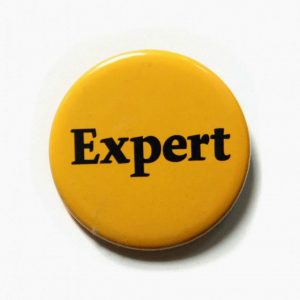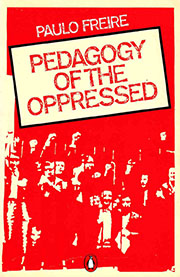Today’s “What We’re Reading” post comes to you from Cynthia Robinson, director of the Tufts Museum Studies program.
Cynthia Robinson
Museum Studies Director, Tufts University
Editor-in-Chief, Journal of Museum Education
Originally posted on JME40 (http://museumeducation.info/jme40), a blog celebrating 40 years of the Journal of Museum Education. Reposted with permission from the Museum Education Roundtable.
When I worked as a museum educator, I defined myself as a facilitator who built bridges linking visitors with objects and ideas. As a facilitator, I translated the content expertise of curators and scholars into language and concepts appropriate to various audiences. My products were tour outlines, programs, labels, curricula, and exhibitions.
Facilitation takes skill, but I never defined that as expertise. Instead I equated expertise with discipline-based scholarship. Moreover, even though I spent two decades working in history museums and even engaged in original research to create exhibitions and programs, I did not consider myself a historian or an expert.
Does this sound familiar? I hope not, but I suspect for many of you it does. Have you sat in exhibition planning meetings and listened to curators and scholars drive the agenda because of the strength of their content knowledge? Museum educators tend to be collaborative and process-oriented, able to subsume self-interest to invest in group-interest, able to listen to others, and able to transform others’ ideas and expertise into products for the public. These are fabulous and sophisticated skills, but often unacknowledged, for they fly under the radar of those who typically hold the power in museums.
So here is my thesis: To shift perception and power, museum educators must redefine themselves as experts, and must learn to express their expertise by grounding it in the work of others. Most disciplines do this. You can’t become a historian without extensive knowledge of the work of other historians, and you can’t become a biologist without understanding a body of scientific knowledge and methodologies developed by others. Experts express their expertise by knowing and citing the work of others and demonstrating how their ideas build upon and differ from those who came before.
There are some differences between the field of museum education and discipline-based fields. Curators and scholars usually develop deep and narrow expertise and may not be expected to participate in unrelated activities. For instance, a curator of Asian Art would not be expected to be an expert on 19th-century redware pottery. A biologist who studies ants would not be expected to publish research articles about polar bears. Yet museum educators are often expected to know about audiences of all types, and to employ engagement strategies of all types; often with ever-changing content, as exhibitions come and go. This is huge! To truly ground museum education expertise in scholarship would require us to be well read in facets of psychology, sociology, and learning theory, as well as discipline-based knowledge.
Nevertheless, most museum educators are able to specialize, and that is where we should put our efforts at building up our expertise. For instance, if you are involved in community engagement with underserved communities, you should read (if you haven’t already) Paulo Freire’s Pedagogy of the Oppressed (1970). You will probably discover that many of your values and assumptions came from him: his belief that a just society cannot be achieved until the disenfranchised have voice and power; his belief that people learn best through dialogue; his belief that students must take responsibility for learning and teachers should learn along with them. Like John Dewey, Freire championed active learning, and castigated the “banking” system of education, in which teachers make “deposits” of information that students receive passively. Reading—or rereading—Freire will help you clarify your own ideas and improve your ability to articulate your goals more clearly. It may help you justify your ideas to colleagues or in grant proposals.
There are many additional writers and thinkers important to the work of museum educators. I use Freire here as an example of how the current philosophies and practices of museum education can emanate from thinkers outside of the museum world. Since Freire, other scholars have refined and added to his ideas, and it is useful to familiarize yourself with those works as well. Treading the intellectual trail of ideas developed over time creates expertise, and expertise in museums provides a platform for impact and equity.
Not long ago I visited an early childhood center at a museum. The educators were developing interesting programs, but had no knowledge of developmental theory to aid their efforts. If they had been familiar with child development scholarship they might have been able to design effective programs more efficiently than trial and error alone. Moreover, they would be able to use the wider context of theory to justify and validate their work to museum administrators, parents and caretakers, and funders.
Museum educators have claimed seats at many tables in museum work; a remarkable change that has occurred in a short time. Now is the time to claim expertise. It is not sufficient to justify a new program by explaining that your colleagues at another museum have done it successfully. Instead, use your knowledge of pedagogy and human behavior to support your work. Use the Journal of Museum Education as your tool. Read its articles to help you gain expertise. Challenge and build upon the work of its authors through discussions with your colleagues and responses to MER blogs. And hone your own ideas and expertise by submitting articles yourself. Add your voice, opinions, and expertise to the field. It cannot grow and prosper without you.
**********
Cynthia Robinson spent 25 years working in museums before becoming the Director of Museums Studies at Tufts University, where she specializes in teaching the next generation of museum educators. She has extensive experience in developing museum programs, curricula and exhibitions, as well as in museum management and administration. She directed a professional museum organization for 10 years, held management positions at three museums, and served on the Museum Education Roundtable’s board and the council of the American Association of State and Local History. She is editor-in-chief of the Journal of Museum Education, a position she’s held for six years.
Opening photo credit: Scott Reinhard, Expert Button (February 2010), via Google image search.





